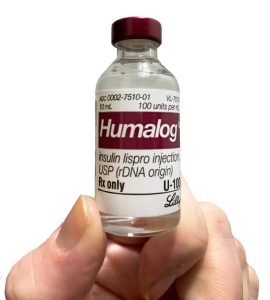Mary McDaniel, a sophomore psychology major, was diagnosed with type 1 diabetes when she was three years old and has been prescribed insulin most of her life. McDaniel is reliant on insulin, so there’s no choice but to pay the price, even as costs drastically increase.
‚ÄúIt‚Äôs a dire-need medication. It‚Äôs a necessity,‚ÄĚ she said.

Photo illustration: Christian Johnson
According to a congressional report released last fall by the Congressional Diabetes Caucus, the price of insulin across the country has more than doubled since 2012 after a nearly 300-percent increase from 2002 to 2013.
‚ÄúDiabetes care is so profitable that it makes sense to quadruple (the price of) the one thing you need,‚ÄĚ McDaniel said. ‚ÄúYou can‚Äôt find a cheaper version of insulin. You just have to have insulin.‚ÄĚ
While type 2 diabetes can often be controlled by diet and exercise, type 1 diabetes is a result of the pancreas being unable to produce sufficient insulin. Therefore, people with type 1 diabetes have to rely on an insulin pump or insulin shots to lower their blood sugar.
‚ÄúIt‚Äôs like water,‚ÄĚ McDaniel said. ‚ÄúWe can go a certain amount (of time) without it, but we‚Äôll end up in the hospital. And we can‚Äôt live long without it.‚ÄĚ
People with type 1 diabetes reported average annual insulin costs of $5,705 in 2016. The average cost was roughly half that, at $2,864 per patient, in 2012, according to a Health Care Cost Institute report released in January.
‚ÄúFor a three month supply, (insulin is) generally $250, but last time with the deductible it was $1,499,‚ÄĚ McDaniel said. ‚ÄúThe pharmacist will ask you, ‚ÄėAre you sure you want to get it?‚Äô Well yeah, it‚Äôs insulin. I can‚Äôt live without it.‚ÄĚ
Grace Conway, a freshman engineering student who also has type 1 diabetes, said that if a patient’s blood sugar spikes for a long period of time, it will lead to diabetic ketoacidosis, which is a serious complication of diabetes that can lead to hospitalization.
‚ÄúIf your blood sugar stays high for a long time, it damages everything in your body,‚ÄĚ Conway said. ‚ÄúThey don‚Äôt know how, but it does. The lenses in my eyes swell, and my vision gets blurry.‚ÄĚ
According to McDaniel, some patients ration out their insulin shots to preserve the dosage, but while rationing, they also have to change their diets. Patients can also choose to get injectables rather than pumps to save money.
A study from Yale University published in 2018 found that one in four diabetic patients admitted to reducing insulin doses on account of the rising prices.
‚ÄúThere really isn‚Äôt any way around it,‚ÄĚ Conway said. ‚ÄúIf I ate, there‚Äôs nothing I could take or do that could lower my blood sugar the way insulin does. If I go on a run, it will lower it, but nothing can (replace) insulin.‚ÄĚ
McDaniel says she is fortunate enough to have access to a health insurance policy and the funds she needs for the treatment, but she is concerned for diabetic patients without health insurance who have to pay out of pocket and for those who don’t have the funds to pay at all.
Dr. Travis Yates, the director of University Health Services, said that insulin is an essential medication for a patient with type 1 diabetes. However, he said he could not offer a specific reason as to why the cost of insulin has increased.
‚ÄúI cannot answer this question, but I believe this pharmaceutical industry issue is being debated at a congressional level, involving insulin as well as many other life-saving cancer medications,‚ÄĚ Yates said.
Many doctors and people who have diabetes point to the lack of downward pressures on the prices in the insulin market as the fundamental reason for the hike in prices.
‚ÄúThese market failures have allowed a handful of players along the insulin distribution pipeline from manufacturers to health insurers to capitalize on their strategic positions, driving up the price of insulin and minimizing competition,‚ÄĚ read the Fall 2018 Congressional Diabetes Caucus report.
Most insulin makers are protected from generic brand competitors by patent law as long as they make changes to their products every several years to extend their exclusivity rights.
‚ÄúIt‚Äôs awful because the people that can‚Äôt afford it, well, there‚Äôs no if ands or buts. You need it,‚ÄĚ Conway said.






